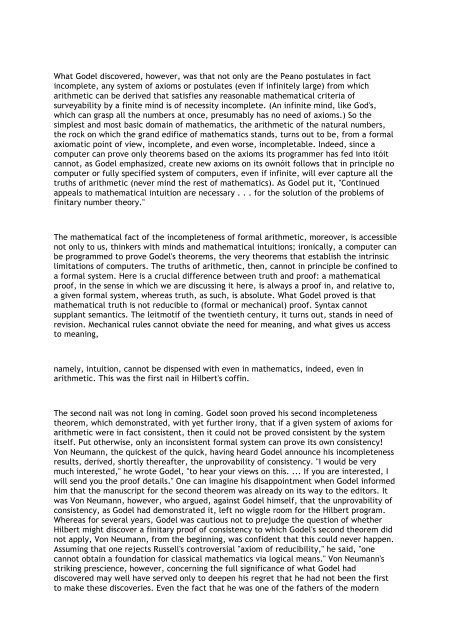Yourgrau P. A world without time.. the forgotten legacy of Goedel and Einstein (Basic Books, 2005)(ISBN 0465092934)(176s)_PPop_
Yourgrau P. A world without time.. the forgotten legacy of Goedel and Einstein (Basic Books, 2005)(ISBN 0465092934)(176s)_PPop_
Yourgrau P. A world without time.. the forgotten legacy of Goedel and Einstein (Basic Books, 2005)(ISBN 0465092934)(176s)_PPop_
You also want an ePaper? Increase the reach of your titles
YUMPU automatically turns print PDFs into web optimized ePapers that Google loves.
What Godel discovered, however, was that not only are <strong>the</strong> Peano postulates in fact<br />
incomplete, any system <strong>of</strong> axioms or postulates (even if infinitely large) from which<br />
arithmetic can be derived that satisfies any reasonable ma<strong>the</strong>matical criteria <strong>of</strong><br />
surveyability by a finite mind is <strong>of</strong> necessity incomplete. (An infinite mind, like God's,<br />
which can grasp all <strong>the</strong> numbers at once, presumably has no need <strong>of</strong> axioms.) So <strong>the</strong><br />
simplest <strong>and</strong> most basic domain <strong>of</strong> ma<strong>the</strong>matics, <strong>the</strong> arithmetic <strong>of</strong> <strong>the</strong> natural numbers,<br />
<strong>the</strong> rock on which <strong>the</strong> gr<strong>and</strong> edifice <strong>of</strong> ma<strong>the</strong>matics st<strong>and</strong>s, turns out to be, from a formal<br />
axiomatic point <strong>of</strong> view, incomplete, <strong>and</strong> even worse, incompletable. Indeed, since a<br />
computer can prove only <strong>the</strong>orems based on <strong>the</strong> axioms its programmer has fed into itóit<br />
cannot, as Godel emphasized, create new axioms on its ownóit follows that in principle no<br />
computer or fully specified system <strong>of</strong> computers, even if infinite, will ever capture all <strong>the</strong><br />
truths <strong>of</strong> arithmetic (never mind <strong>the</strong> rest <strong>of</strong> ma<strong>the</strong>matics). As Godel put it, "Continued<br />
appeals to ma<strong>the</strong>matical intuition are necessary . . . for <strong>the</strong> solution <strong>of</strong> <strong>the</strong> problems <strong>of</strong><br />
finitary number <strong>the</strong>ory."<br />
The ma<strong>the</strong>matical fact <strong>of</strong> <strong>the</strong> incompleteness <strong>of</strong> formal arithmetic, moreover, is accessible<br />
not only to us, thinkers with minds <strong>and</strong> ma<strong>the</strong>matical intuitions; ironically, a computer can<br />
be programmed to prove Godel's <strong>the</strong>orems, <strong>the</strong> very <strong>the</strong>orems that establish <strong>the</strong> intrinsic<br />
limitations <strong>of</strong> computers. The truths <strong>of</strong> arithmetic, <strong>the</strong>n, cannot in principle be confined to<br />
a formal system. Here is a crucial difference between truth <strong>and</strong> pro<strong>of</strong>: a ma<strong>the</strong>matical<br />
pro<strong>of</strong>, in <strong>the</strong> sense in which we are discussing it here, is always a pro<strong>of</strong> in, <strong>and</strong> relative to,<br />
a given formal system, whereas truth, as such, is absolute. What Godel proved is that<br />
ma<strong>the</strong>matical truth is not reducible to (formal or mechanical) pro<strong>of</strong>. Syntax cannot<br />
supplant semantics. The leitmotif <strong>of</strong> <strong>the</strong> twentieth century, it turns out, st<strong>and</strong>s in need <strong>of</strong><br />
revision. Mechanical rules cannot obviate <strong>the</strong> need for meaning, <strong>and</strong> what gives us access<br />
to meaning,<br />
namely, intuition, cannot be dispensed with even in ma<strong>the</strong>matics, indeed, even in<br />
arithmetic. This was <strong>the</strong> first nail in Hilbert's c<strong>of</strong>fin.<br />
The second nail was not long in coming. Godel soon proved his second incompleteness<br />
<strong>the</strong>orem, which demonstrated, with yet fur<strong>the</strong>r irony, that if a given system <strong>of</strong> axioms for<br />
arithmetic were in fact consistent, <strong>the</strong>n it could not be proved consistent by <strong>the</strong> system<br />
itself. Put o<strong>the</strong>rwise, only an inconsistent formal system can prove its own consistency!<br />
Von Neumann, <strong>the</strong> quickest <strong>of</strong> <strong>the</strong> quick, having heard Godel announce his incompleteness<br />
results, derived, shortly <strong>the</strong>reafter, <strong>the</strong> unprovability <strong>of</strong> consistency. "I would be very<br />
much interested," he wrote Godel, "to hear your views on this. ... If you are interested, I<br />
will send you <strong>the</strong> pro<strong>of</strong> details." One can imagine his disappointment when Godel informed<br />
him that <strong>the</strong> manuscript for <strong>the</strong> second <strong>the</strong>orem was already on its way to <strong>the</strong> editors. It<br />
was Von Neumann, however, who argued, against Godel himself, that <strong>the</strong> unprovability <strong>of</strong><br />
consistency, as Godel had demonstrated it, left no wiggle room for <strong>the</strong> Hilbert program.<br />
Whereas for several years, Godel was cautious not to prejudge <strong>the</strong> question <strong>of</strong> whe<strong>the</strong>r<br />
Hilbert might discover a finitary pro<strong>of</strong> <strong>of</strong> consistency to which Godel's second <strong>the</strong>orem did<br />
not apply, Von Neumann, from <strong>the</strong> beginning, was confident that this could never happen.<br />
Assuming that one rejects Russell's controversial "axiom <strong>of</strong> reducibility," he said, "one<br />
cannot obtain a foundation for classical ma<strong>the</strong>matics via logical means." Von Neumann's<br />
striking prescience, however, concerning <strong>the</strong> full significance <strong>of</strong> what Godel had<br />
discovered may well have served only to deepen his regret that he had not been <strong>the</strong> first<br />
to make <strong>the</strong>se discoveries. Even <strong>the</strong> fact that he was one <strong>of</strong> <strong>the</strong> fa<strong>the</strong>rs <strong>of</strong> <strong>the</strong> modern


